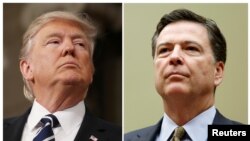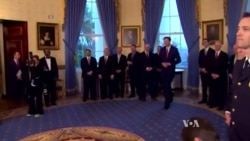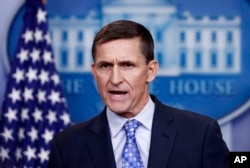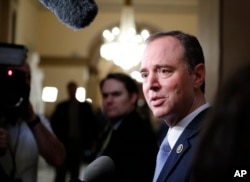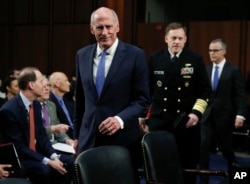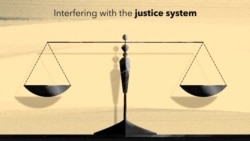Fired FBI Director Jim Comey will tell a Senate Intelligence Committee Thursday that President Donald Trump asked him for loyalty during White House conversations concerning the agency’s handling of investigations into current and former administration officials, including the president himself.
The committee released an advance copy of Comey's seven-page opening statement a day before his scheduled appearance. This came shortly after the Director of National Intelligence and other top intelligence officials refused to answer the committee's questions about Comey and the Russia investigation.
WATCH: Capitol Hill correspondent Mike Bowman's video report
In his statement, he offers explosive details and accounts of five separate conversations he had with Trump, including strong suggestions the president tried to influence FBI investigations.
“The president said, 'I need loyalty, I expect loyalty,' ” Comey recounted about one White House meeting. “I didn’t move, speak or change my facial expression in any way during the awkward silence that followed. We simply looked at each other in silence.”
Statement to committee
In his prepared remarks, Comey said he told Trump three times that he was not a subject of the FBI investigation into whether his associates had improper contacts with Russian government officials.
In another passage, Comey will testify that Trump asked him on February 14 to "let go" of the investigation into Michael Flynn, who had been fired as national security adviser the previous day. "I hope you can see your way clear to letting this go, to letting Flynn go." Comey quotes Trump as saying. "He is a good guy. I hope you can let this go."
Trump last month flatly denied pressuring Comey to close or back down from the Flynn investigation. "No. No. Next question," he replied to a reporter's question.The president also rejected allegations that his associates colluded with Russia to influence last November's presidential election, calling it a "witch hunt."
Trump supporters see vindication
After Comey's statement was made public Wednesday, Trump's supporters suggested there was nothing to indicate presidential wrongdoing.
Trump's private counsel for the Russia investigation said the president "feels completely and totally vindicated."
"The president is pleased that Mr. Comey has finally publicly confirmed his private reports that the president was not under investigations in any Russian probe," attorney Marc E. Kasowitz said in a statement. "He is eager to continue to move forward with his agenda."
Republican National Committee Chairwoman Ronna McDaniel made the same point in a statement on the RNC website: "President Trump was right. Director Comey's statement reconfirmed what the president has been saying all along —- he was never under investigation."
Democrats see it differently
Democrats in Congress had a different take on the significance of the testimony.
Congressman Adam Schiff, the senior Democrat on the House Intelligence Committee, called Comey's allegations "troubling." In a statement, Schiff said the president's interaction with Comey "represents yet another improper effort to coerce the intelligence agencies to do public relations for the White House and to undermine the independence and integrity of the intelligence community."
Several other Trump critics said the accounts of his attempted intervention were inappropriate and could amount to obstruction of justice.
”I don't think there's any real smoking gun," a former veteran FBI official told VOA, asking for anonymity because of the sensitivity surrounding the investigation.
"I think Director Comey did everything correctly," he added. "It just shows a president who's not aware of how the government works or that the government's a bureaucracy, and [he] was approaching it more like a business deal."
FBI head fired in May
Trump fired Comey last month. The White House at first issued a statement saying the dismissal had been made on the recommendation of Deputy Attorney General Rod Rosenstein, who had sent a memo criticizing Comey's handling of an investigation into former Democratic presidential candidate Hillary Clinton's emails.
Trump later contradicted that account, telling a reporter he was "thinking of the Russia thing" at the time he fired Comey.
Presidential scholars say that, if confirmed, Comey's version of events would represent a significant challenge to the traditional barriers meant to preserve the independence of U.S. law enforcement institutions.
"There is a level of concerning interaction between the president and the FBI that I don't think we've seen since the Watergate era," said Dan Mahaffee, executive director of the Center for the Study of the Presidency and Congress.
Earlier Wednesday, two top U.S. intelligence officials told the Senate Intelligence Committee they did not feel inappropriately pressured by the president to publicly disavow possible Russian collusion with Trump aides in last year's election.
Both Director of National Intelligence Dan Coats and National Security Agency Director Michael Rogers told committee members they would not discuss details of their White House meetings with Trump in recent months. They refused to answer questions about whether Trump asked them to intervene to curb the investigation of Russian interference in the 2016 campaign.
Ken Bredemeier and National Security Correspondent Jeff Seldin contributed to this report.
WATCH: What does obstruction of justice mean?




